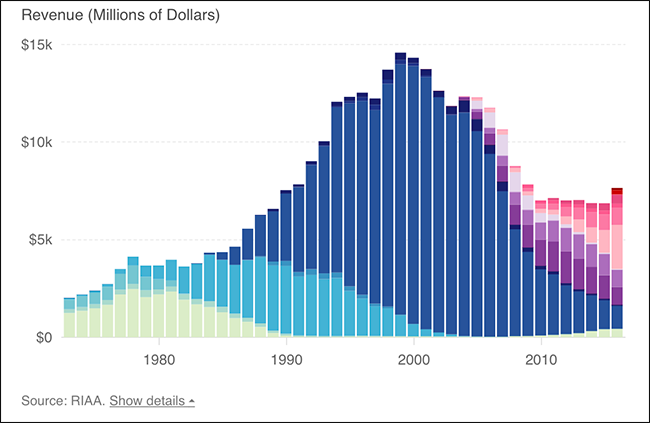Quick Links
Spotify is great. $10 a month gets you access to pretty much all the music ever made, and you're done. We're not going to get that kind of thing for TV shows and movies.
Wouldn't it be nice if one $10 subscription could get you all the TV shows and movies you wanted? A lot of people imagined Netflix would turn into that, and honestly we can't blame them. When Netflix launched their streaming service, it was a veritable smorgasbord, offering access to almost every TV show you could imagine. The library has shrunk every year since then, even as Netflix spends more and more money. Netflix plans on spending $8 billion on original content this year, meaning they'll have around 700 original movies and TV shows by the end of the year.
Which has fans asking: why are fewer and fewer of the shows and movies they already love showing up? Why isn't Netflix just buying that content, instead of spending all this money on original programming? To put it another way: why can't Netflix just become Spotify for TV?
The answer, basically, is way too much money is at stake for that to ever happen.
The Music Industry Was Desperate
The story of the music industry is a familiar one: massive CD-driven growth in the 90s followed by a digital-driven decline in the early 2000's. Here's a chart from the RIAA, showing what that looks like:
The dark blue dominating the 90s represents CD sales, and the purples and pinks above that in recent years represents subscription services. That money doesn't begin to cover what was lost, but it's growing in an industry that is otherwise in decline.
This is why the music industry is willing to play ball with companies like Spotify: they need something to stem the losses. Sure: every person in the USA paying $10 would represent a fraction of 90s CD revenue, but it's better than nothing. And who knows? If growth continues, and streaming prices eventually go up, maybe the music industry will get back to where it was.
TV and Movie Companies Are Bigger Than The Entire Music Industry
Let's back up and look at that chart again---notice that 1999 was a high point for the US record industry. That year saw the industry earn nearly $15 billion, most of that made up of CD sales.
Disney earned $55.7 billion in 2017. Comcast, which owns NBC Universal, earned $84.5 billion. Viacom earned $13 billion.
The music industry was and still is massive, but even in 1999 the entire sector doesn't really compare with single players in the TV and movie industry.
These huge media companies are the ones that own the rights to basically every TV show and movie you've ever loved, and there's no way those companies could begin to maintain that level of revenue in a future where all content only costs $10 a month (or even $20 or $30).
Making TV Costs Way More Than Making Music
You could say this is all because of greed, and you wouldn't be entirely wrong. But it's also worth pointing out that the cost of making quality video content is much higher than the cost of making music.
You could, hypothetically, compose and record a hit album in your garage right now for a few thousand dollars. You'd need a lot of talent, some relatively affordable equipment and instruments, and a computer for mixing everything.
The same can't be said about a TV show, at least not one that's likely to become popular with a mass audience. You need actors, writers, multiple directors, special effects artists, crew, et cetera. Then you need cameras, costumes, lighting equipment...you get the idea.
High end TV dramas cost between $5 and $7 million per hour to produce, while single camera sitcoms cost around $1.5 million. That's a high barrier to entry, which means only companies with a lot of money in hand can hope to get involved. And those companies, after making something, have every incentive to milk it for all its worth.
The cable TV subscription model gave companies that money for a long time: households paid anywhere from $50 to $150 a month for content, and watched advertising on top of that. Netflix is only charging $10 a month, and famously has no ads.
It doesn't take much math: Netflix's revenue isn't going to add up to the same amount of money any time soon.
Which is why every company you can think of is launching their own streaming service right now. From a consumer standpoint, this sucks: all of these services add up to about what a cable subscription costs, prompting some people to say that cord cutting is losing its luster. Realistically, however, it was never going to work out any other way.
TV Networks Didn't Take Netflix Seriously. That Changed.
There's a reason Netflix used to have so much great content: they got a great deal. In the early days of streaming TV networks didn't take online streaming seriously, so they were more-or-less happy to take whatever money Netflix would offer them. It was the balance sheet equivalent of money found in the couch cushions: you'd be crazy not to take it.
But then something happened: people saw how much content Netflix offered for so little money and started dropping their cable subscriptions. Cable revenue is declining, and the companies that own content want to get their money back from somewhere. Asking Netflix to pay more for content rights is an obvious solution. If Netflix won't pay, no problem: someone else will, or they can launch their own service.
Which is about when Amazon entered the streaming market, and started buying up the rights to shows that Netflix had before. Comcast started offering NBC's streaming content to cable subscribers, in order to keep that model alive. CBS went ahead and created its own streaming service, using a new Star Trek show to promote it.
And then there's the 55 billion pound elephant in the room: Disney. Reports indicate they plan on launching their own streaming service. With ESPN, Pixar, Star Wars, Marvel movies, and, oh yeah, Disney cartoons, this thing is going to find a large group of people willing to pay money every month---and that's before we even talk about Disney potentially buying Fox.
With that much leverage, you can hardly expect Disney to settle for a cut of Netflix's $10 a month. No: Disney is going to launch their own service, use their massive back catalog as leverage, and cash in directly. Look all over the TV and movie industry and you'll see this pattern repeating: every company is hoping their back catalog can convince people to pay for a streaming service.
Which is why there will never be a Spotify for TV shows and movies---at least, not at the $10 a month price point. Companies aren't going to give valuable assets to Netflix for that little.
This, by the way, is why Netflix is so focused on original content right now. They need to own their own back catalog to have a chance in the wars to come. It sucks that they don't have as much stuff you already love, but they have to get you to love stuff they own in order to survive long term.
One reasonable subscription for unlimited TV and movies sounds great. But unless something changes it's not going to happen anytime soon.
Photo credit: Concept Photo, Antonio Guillem



